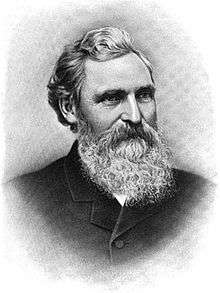Charles N. Fox

Charles Nelson Fox (March 9, 1829 - April 26, 1903) was an Associate Justice of the Supreme Court of California from June 25, 1889 to January 7, 1895.
Early life
Born at Redford, Wayne County, Michigan to Benjamin F. Fox, a farmer of English descent,[1] Fox moved to Ann Arbor at the age of fifteen to earn his own living, and to attend the newly opened Ann Arbor University.[2] Due to a bout of illness,[1] and unable to afford tuition, he took a job at a printing office, and soon became an editor.[2] He was elected city recorder of Ann Arbor, and acted as mayor of the city a portion of the term. He read law in the office of Kingsley & Morgan, and was admitted to the bar by the Supreme Court of Michigan in 1856.[1][2]
Legal career
In August 1857, he moved to San Mateo County, California, and shortly thereafter was appointed to fill a vacancy in the office of the district attorney. He won successive elections to the office for five years, when he declined further election.[1][2] He was retained by the Spring Valley Water Company to attend to their business in San Mateo County, and succeeded in securing the legal rights and property without involvement in any lawsuits over a ten year period. He then became a local attorney for the newly organized San Francisco and San Jose Railroad Company, securing their right of way through San Mateo County, and thereafter became president and attorney of the Western Pacific Railroad Company. He then moved from Redwood City to San Francisco and was appointed general attorney of the Spring Valley Water Company, and continued to act as one of its legal advisers for nearly forty years.[2]
He declined several overtures to accept judicial and other positions, but ran for a seat in the first session of the legislature held under the 1879 Constitution of California. He was made chairman of the judiciary committee, and used his position to keep bad laws out of the statutes, reportedly causing the postponement of a thousand bills. Very few bills that he opposed ultimately passed, and every one that was passed against his opposition on the ground that it conflicted with the constitution, was eventually pronounced unconstitutional by the state Supreme Court.[2]
In 1881 he was selected as general counsel for the Pacific Mutual Life Insurance Company, a position that he held until June, 1889, when he was appointed by Governor Robert Waterman to be an associate justice of the Supreme Court following the resignation of Justice Jackson Temple. Fox served on the court to the end of the next year, performing "as large an amount of work as any other member of the court", and authoring one of the most noted opinions of the term in Jessup's Case,[3][2] establishing a rule by which an illegitimate child can become legitimized.[1]
After leaving the court, he was a member of the law firm of Campbell, Fox & Campbell, then with the firm of Fox, Kellogg & King, which became Fox, Kellogg & Gray until 1895, when it became the firm of Fox & Gray until Fox's death. He was working up until the day of his death, leaving his office on the twenty-sixth day of April, about five o'clock in the afternoon, and dying before morning had dawned.[2]
Personal life
Fox had married in Michigan, but lost his first wife there. In 1864 he married Mary Schwartz Rive, a native of France, who came to California in 1857 and lost her first husband soon after her arrival. Between his two wives he had eight children, but only two survived him, Mrs. Mary Gray and Miss Ida Frances Fox.[1]
Fox became a member of the Odd Fellows at the age of 21, and was active and influential in that organization throughout his life, serving as grand master for the state of California in 1867-68, grand patriarch in 1868-69, and representative to the grand lodge of the United States in 1869-70. He was the first president of the Odd Fellows' home founded under his administration, acting in that capacity from 1893 to 1898.[1]